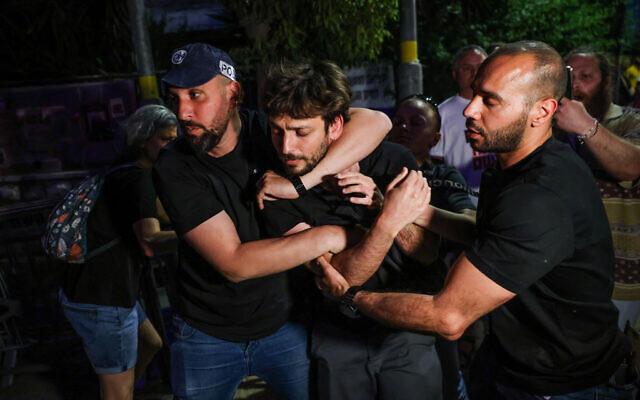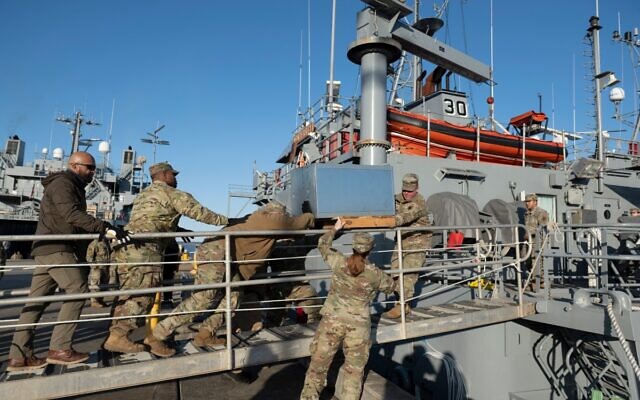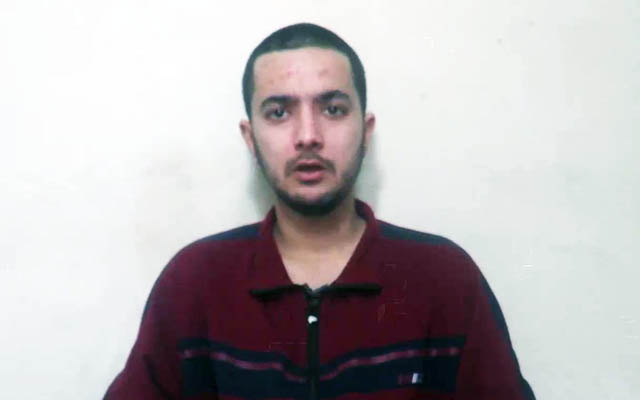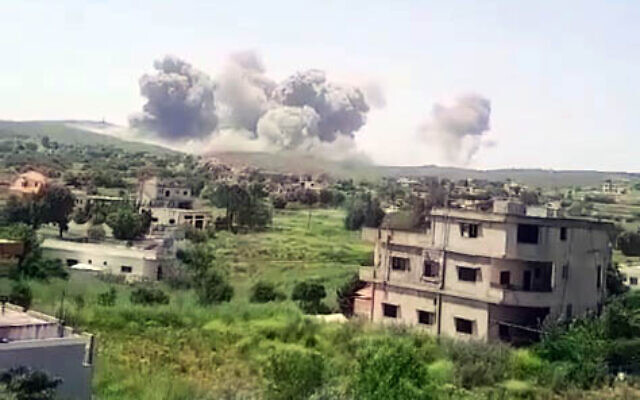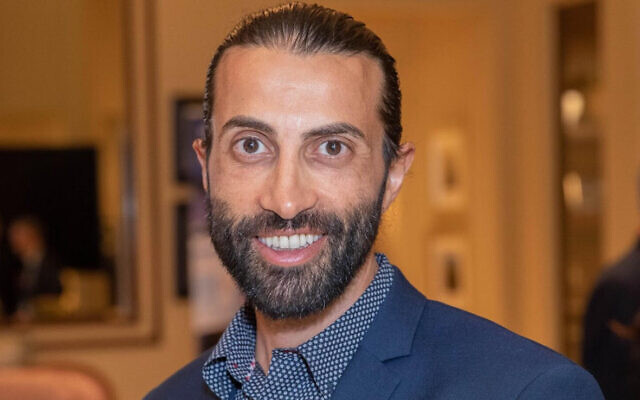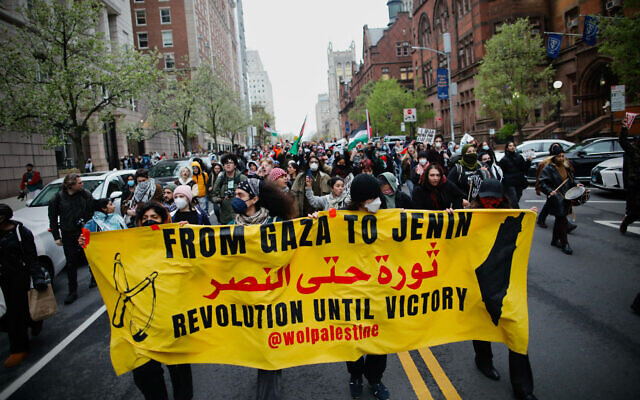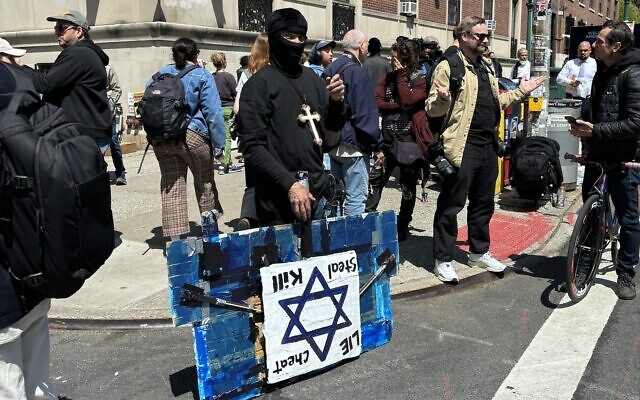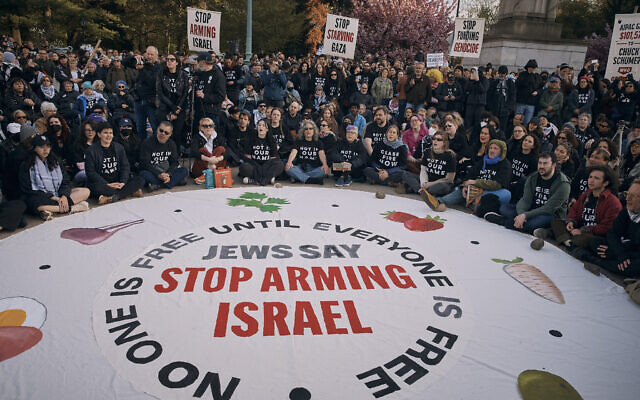17 policemen, 200 Palestinians hurt as hundreds riot on Temple Mount
One officer moderately wounded in intense clashes after Ramadan prayers; police use stun grenades, rubber-coated bullets after Palestinians throw rocks and bottles
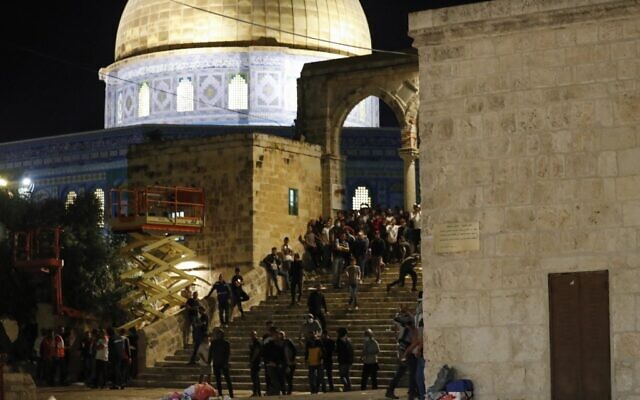
Israeli police burst into the Temple Mount compound on Friday evening after Palestinians threw rocks and bottles at officers, as widespread clashes in Jerusalem spread to the holy site following prayers held there on the last Friday of the Muslim holy month of Ramadan.
Police said 17 police officers were hurt and around half of those hospitalized, with one in moderate condition after taking a rock to the head. Meanwhile the Palestinian Red Crescent reported that at least 205 Palestinians were wounded in clashes throughout Jerusalem, mostly around the Temple Mount and by Damascus Gate. Eighty-eight Palestinians were hospitalized, mostly for injuries with rubber-coated steel bullets, it said.
By midnight the violence — some of the worst in Jerusalem for years — seemed to have subsided, with most protesters dispersing.
Police said Friday evening that force used “riot dispersal means following violent disturbances on the Temple Mount, during which hundreds of suspects began throwing stone, bottles and objects at police officers.”
Video from the scene showed pitched battles, with Palestinians throwing chairs, shoes, rocks and bottles, and shooting fireworks, and police responding with stun grenades, tear gas and rubber bullets.
Protesters chanted “Allahu Akbar,” or “God is great.” Several wounded demonstrators could be seen being carried away on stretchers.
Most of the Palestinians hospitalized were being treated at Al-Makassed Hospital in East Jerusalem. The hospital was urgently calling for people to come and donate blood.
#BREAKING : Ongoing Clashes between #Palestinians and Israel security near Temple Mount / Aqsa Mosque area in #Jerusalem.
This comes on last Friday of #Ramadan, #Israel security using sound grenades to disperse protests: pic.twitter.com/ZVaLMGku09
— Global.TV (@GlobalTelevsion) May 7, 2021
In a statement, Israel Police said: “We will not allow riots, violence and attempts to harm police officers through taking advantage of the freedom of worship and religion, and turning it into a violent incident.
“We will respond with a heavy hand to all violent disturbances, riots and attacks on our forces.”
Demonstrators had called for more people to try and reach the compound, but police blocked roads leading to the site.
Footage on social media appeared to show police officers on the roof of the Al-Aqsa Mosque.
عاجل| شرطة الاحتلال تعتلي سطح المصلى القبلي في المسجد الأقصى الآن pic.twitter.com/sr6cQmNucY
— ????????????????منير الجاغوب ???????????????? (@MonirAljaghoub) May 7, 2021
The Red Crescent also said that its attempts to send reinforcements from the West Bank to Jerusalem to deal with the wounded were blocked by Israeli forces.
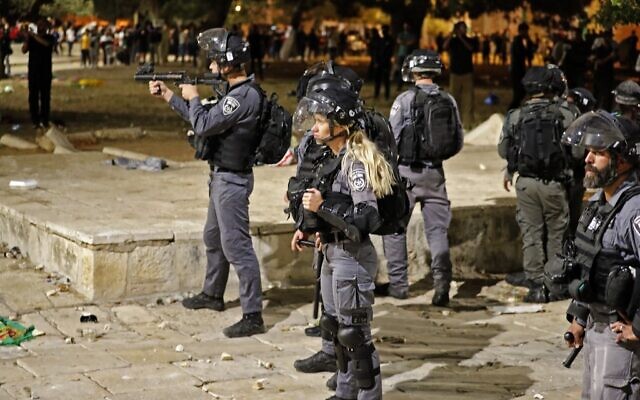
The Temple Mount in the Old City of Jerusalem has long been one of the main flashpoints of Israeli-Palestinian friction. The holiest place in Judaism — as the site of the two biblical temples — is also home to the Muslim holy sites of the Al-Aqsa Mosque and Dome of the Rock.
Another video from tonight at Al-Aqsa/Temple Mount (credit: unknown). This appears to be the most intense incident at Al-Aqsa since 2017. pic.twitter.com/XQ9oUakSZP
— Aaron Boxerman (@aboxerman1) May 7, 2021
There are growing fears that the confrontations in Jerusalem could intensify still further.
Saturday night is “Laylat al-Qadr” or the “Night of Destiny,” the most sacred in the Muslim holy month of Ramadan. Worshipers will gather for intense nighttime prayers at the Al-Aqsa Mosque.
Sunday night is also the start of Jerusalem Day, a national holiday in which Israel celebrates the unification of Jerusalem — when Israel captured the eastern half of the city, including the Old City, from the Jordanians in the 1967 war — and religious nationalists hold parades and other celebrations in the city.
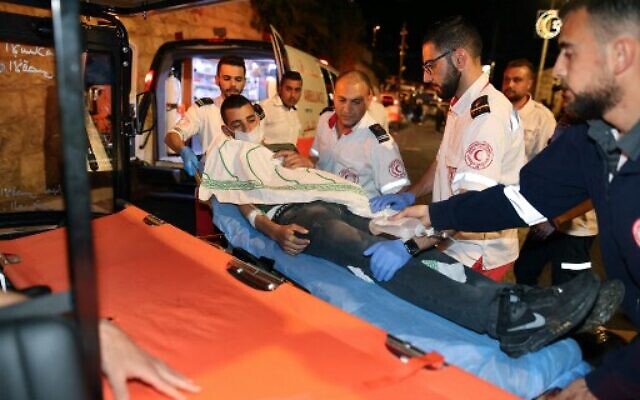
The Islamic Movement called on police to leave the site and said it “holds the Israeli authorities fully responsible for any deterioration and any bloodshed in Jerusalem and the blessed Al-Aqsa Mosque.”
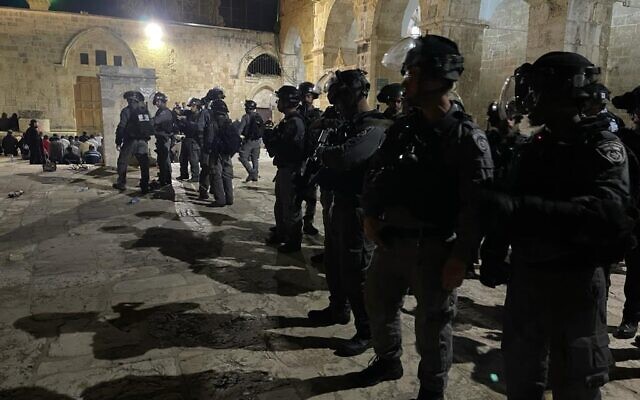
It called on Arab Israelis to come to Jerusalem for “Laylat al-Qad” celebrations to counter “calls by settlers to storm Al-Aqsa Mosque.”
Earlier Friday, as tens of thousands gathered for afternoon Ramadan prayers, some worshipers waved flags of the Hamas terror group and reportedly called for attacks on Israel.
Video showed throngs of people at the compound, some of whom were waving the green flag of Hamas, the Islamist terror group that rules the Gaza Strip.
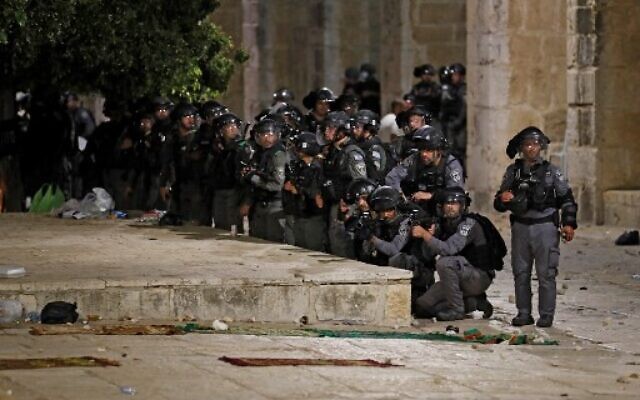
“We are all Hamas, waiting for your orders commander Mohammed Deif. Hamas — shoot a rocket at Tel Aviv tonight,” they were quoted as chanting by Channel 13 news, referring to the head of the terror movement’s armed wing.
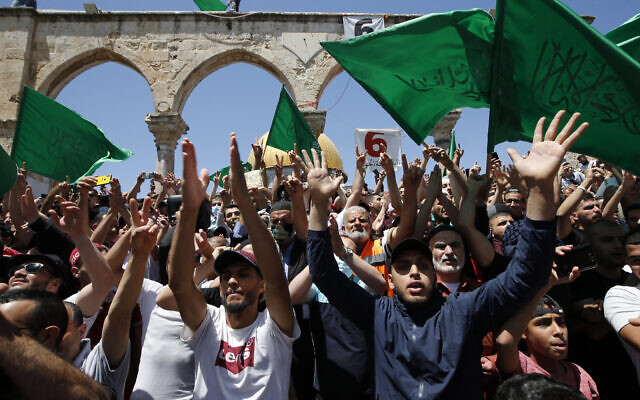
The clashes came amid spiraling tensions over the pending eviction of four Palestinian families in the Sheikh Jarrah neighborhood as part of a long legal battle with right-wing Jewish Israelis trying to acquire property in the neighborhood.
On Tuesday, Deif warned Israel would pay a “heavy price” if the evictions went ahead, raised fears of a wider conflict could be sparked as Hamas and other factions in Gaza warn of renewed violence over the issue.
Tensions in Jerusalem, specifically around the Old City, also flared last month after police prevented people from congregating outside Damascus Gate at the start of Ramadan, which Arabs said was an inflammatory move that obstructed a long-held tradition of gathering at the site during the Muslim holy month. Authorities later canceled the policy.
After some Palestinians filmed videos in which they attacked ultra-Orthodox passersby, the Jewish supremacist Lehava group responded by marching through Jerusalem’s downtown calling for “Death to Arabs” and searching for Palestinians to attack.
Additionally, tensions have also soared in the West Bank over the past week, and on Friday three Palestinians opened fire at Border Police near a military base. Israeli forces shot two of the assailants dead and critically wounded the third.
All three attackers identified with Hamas, the Kan public broadcaster reported, citing Palestinian sources. Officials have said they were planning a major terrorist attack, possibly in Jerusalem.
The Temple Mount clashes also come after fresh clashes broke out in the Sheikh Jarrah neighborhood on Friday evening, for the third day in a row.
Police said a protest in Sheikh Jarrah “quickly turned into a violent riot,” with rocks thrown at officers.
Citing “the chants that were heard and the rioting that began, the order was given,” a police statement said the protesters were instructed to disperse, but did not heed the order.
As cops dispersed the demonstrators, they threw rocks at the officers, who responded with riot dispersal means, according to the statement. The Haaretz daily said two protesters were injured by stun grenades.
Police arrested two people on suspicion of rioting and rock-throwing.
המתיחות בירושלים: מחאה אלימה בשייח ג'ראח, שני מפגינים נעצרו | תיעוד מהעימותים@SuleimanMas1 pic.twitter.com/pDFg6mo6uL
— כאן חדשות (@kann_news) May 7, 2021
Numerous lawmakers from the predominantly Arab Joint List and left-wing Meretz party attended the protest.
“They are forcefully expelling [Palestinians] from here, a disgrace,” Joint List MK Ofer Cassif was quoted saying by the Ynet news site.
Cassif, the only Jewish lawmaker in the Joint List, has attended several recent protests in Sheikh Jarrah, including a demonstration there last month in which he was beaten and punched by officers. Police have claimed Cassif goaded the officers, several of whom are being investigated over the incident.
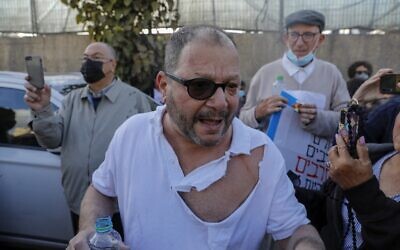
At Friday’s protest, Cassif’s glasses were again broken after he was shoved by an officer, according to Haaretz, while Ynet quoted fellow Joint List MK Ahmad Tibi saying he was pushed by police.
“Troops arrive here, enter homes and break bones. We see them beating the protesters… and what happened yesterday when scum like him arrives,” Cassif said, referring to far-right Religious Zionism MK Itamar Ben-Gvir. “He receives support.”
Ben Gvir, a disciple of the late extremist rabbi Meir Kahane, on Thursday set up what he claimed to be a parliamentary office in Sheikh Jarrah. He agreed on Friday to vacate the site in return for a police presence near homes claimed by right-wing Jews.
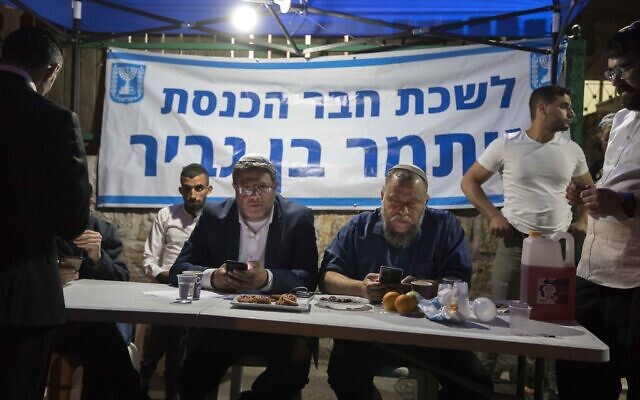
Friday’s clashes between protesters and police followed two consecutive nights of rioting in Sheikh Jarrah, fueled by a years-long land dispute between Palestinians and right-wing Jewish nationalists in the strategic district near Jerusalem’s Old City.
Along with the warnings from terror groups and denunciations of the Palestinian Authority, Israel is also facing growing international scrutiny over the pending evictions, which the United Nations on Friday said could be a “war crime.”
Israel’s Foreign Ministry issued a statement Friday pushing back on criticism of the pending evictions and accused the Palestinian Authority and terror organizations of fanning the tensions.
“Regrettably, the PA and Palestinian terror groups are presenting a real estate dispute between private parties, as a nationalistic cause, in order to incite violence in Jerusalem,” it said. “The PA and Palestinian terror groups will bear full responsibility for the violence emanating from their actions. The Israel police will ensure public order is maintained.”
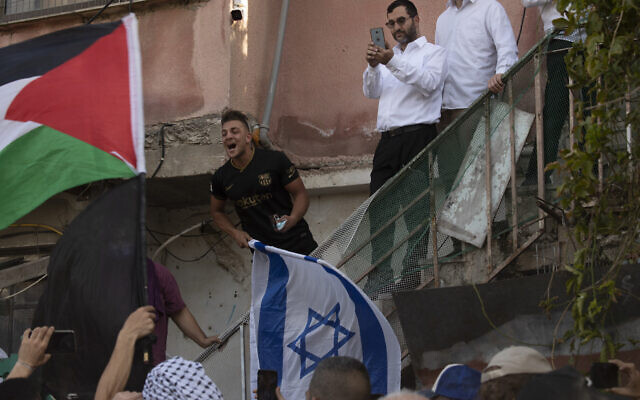
Dozens of Palestinians in Sheikh Jarrah may be removed from their homes in the coming weeks if the Supreme Court turns down their appeal against a pending eviction. They are likely to be replaced by right-wing Jewish nationalists who say the Palestinian homes were built on land owned by Jewish associations before the establishment of the State of Israel.
According to Ir Amim, a left-wing human rights group focusing on Jerusalem, around 200 families in East Jerusalem are now under threat of eviction, with cases slowly marching through administrative bodies and Israeli courts. Around 70 of those families live in Sheikh Jarrah.
The neighborhood has long been a focal point of Jewish-Arab tensions. A small Jewish community lived in the area before 1948, when East Jerusalem fell under Jordanian control. Home to a shrine revered as the final resting place of Shimon Hatzadik, a third-century BCE high priest also known as Simeon the Just, the neighborhood is often visited by Jewish pilgrims.
Israel captured East Jerusalem from Jordan in the 1967 Six Day War and later annexed it, in a move not recognized by most of the international community.
Agencies contributed to this report.



